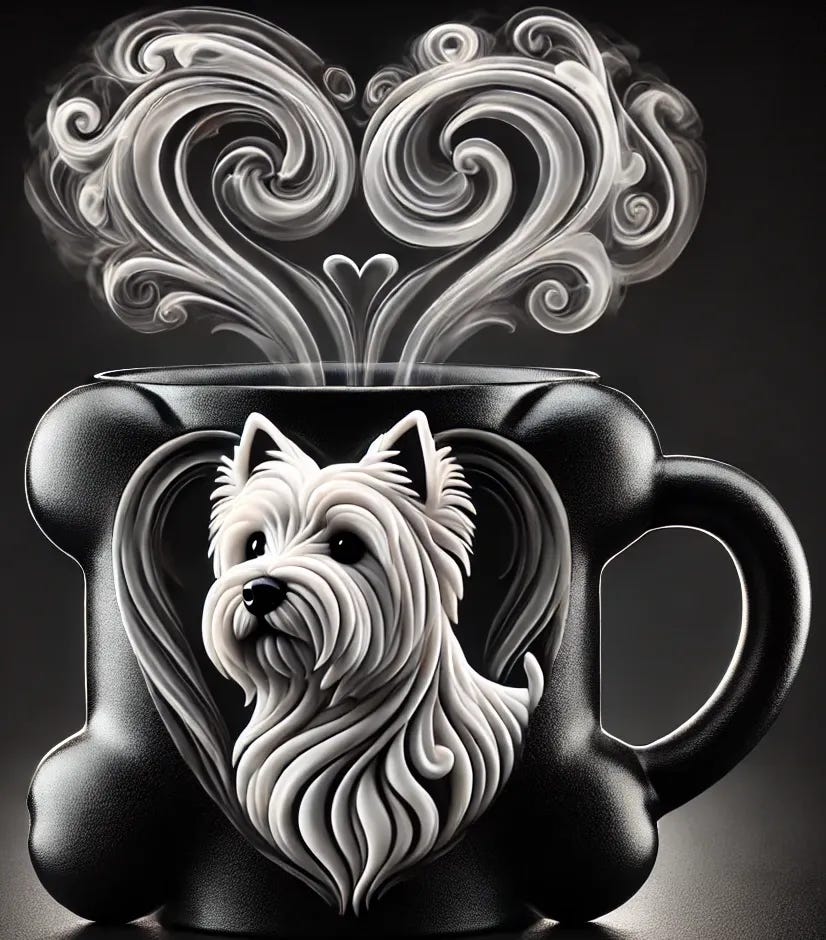If you believe in the importance of free speech, subscribe to support uncensored, fearless writing—the more people who pay, the more time I can devote to this. Free speech matters. I am a university professor suspended because of a free speech issue, so I am not speaking from the bleachers. The button below takes you to that story if you like.
Please subscribe to receive at least three pieces /essays per week with open comments. It’s $5.75 per month, or about $4 USD. Everyone says, “Hey, it’s just a cup of coffee.” (With me, it's not per day but just one per month.) But if you’re like me, you go, “Hey, I only want so many cups of coffee!” I get it.
But I only ask that when you choose your coffee, please choose mine. Cheers.
_______________________________________________________________________
I love my dogs. Sometimes, they jostle with each other to see who can sit closer to me. It’s glorious.
I have difficulty trusting anyone who doesn’t like dogs; it’s a big signal for me, and if you don’t like dogs, you might be stuck on yellow.
The bond between humans and dogs is transcendent—it feels ancient, profound, and uniquely pure.
Dogs do not demand conversations, judge your taste in TV shows, or care if you’ve had a bad day. They simply want to be near you. Whether they scratch at the bathroom door, curl up at your feet, or meet you at the door like you’re the prodigal son, even if it’s only been a ten-minute trip to the store, their presence is so clear - it’s love.
It’s tempting for sceptics to reduce their affection to a clamouring for food. Surely, some argue, their motivations are selfish—rooted in instinct, dependence, or survival. Yet science and everyday experience suggest otherwise: dogs are not just furry opportunists. Their desire to be with us reflects something more profound—an attachment rooted in love.
A 2014 study using fMRI brain scans revealed that dogs process their owner’s scent in the brain’s reward centre, the caudate nucleus, associated with positive emotions. The study concluded that a familiar human scent is more rewarding to a dog than food. Yep, they love you more than beef.
Research shows that dogs can read our emotions by analysing facial expressions. In a 2016 study, dogs demonstrated the ability to distinguish between happy and angry faces, responding with empathy and concern to signs of distress.1
When you look into your dog’s eyes, something magical happens; it’s not lust (we will not go there); it is too pure for that. You and your dog release oxytocin2, the hormone responsible for bonding between human mothers and infants. This hormonal exchange underscores the emotional depth of the human-dog relationship.
What other creature desires your presence so completely and so unconditionally?
Does your wife come in and visit you when you’re taking a dump? A dog’s sense of smell is much better than ours. Do you think they don’t get your stink? It isn’t coming up roses for them.
Our conversations do not entertain dogs, nor do they share our human obsessions with productivity or aesthetics. Their love is not transactional, though it is sometimes mistaken for such. They lie silently beside you or on the floor. They don’t require your words or actions to validate their love. Just being near you is enough.
This relentless loyalty is not rooted in insecurity but in attachment. Dogs, like humans, are social animals. But unlike humans, their love is rarely complicated by ego, fear, or conditions. They embody what we aspire to: love unburdened by expectation.
Perhaps the most beautiful truth about dogs is that their attachment to us doesn’t have to be analysed or explained. Why must we question their loyalty or assume ulterior motives? Why not accept their presence as the purest form of love—a reflection of their bond with us that defies human cynicism?
In The Four Loves, writer C.S. Lewis described affection as a " familiar love” rooted in closeness and the small details of life. Dogs exemplify this perfectly. They love us not for grand gestures but for the everyday: the sound of our voice, the smell of our skin, the rhythm of our routines.
No other creature mirrors this selfless devotion. Cats may come close, but affection is often conditional, tied to moods and whims. Humans, as complex as we are, cannot replicate the simplicity of canine love. Our relationships are tangled with expectations, doubts, and egos. Dogs remind us of something purer, freer, and more beautiful: a love that just is.
Dogs don’t need reasons to love us, nor do they offer excuses. Their devotion isn’t insecurity—an instinct honed over millennia of their companionship, evolving alongside us to create a bond unlike any other. What is this bond if not a divine gift? Dogs, in their quiet way, teach us about grace. They love us as we are, not as we strive to be.
As poet Mary Oliver wrote:
“Because of the dog’s joyfulness, our own is increased. It is no small gift.”
And so, when your dog scratches at the bathroom door, sit beside you on the couch, or curls up at your feet, recognise it for what it is: a love that needs no words, explanations, or conditions. It is the purest form of love. It is simply enough.
Good boy. Good girl.
_____________________________________________________________________
Reward Responses in Dogs to Human and Food Odors: An fMRI Study” (Gregory Berns, Emory University
“Oxytocin-gaze Positive Loop and the Coevolution of Human-Dog Bonds” (Science, 2015).







What a blessing that you have had them with you during the past year.
Dogs are the best. Oscar Wilde said it best about cats: ‘moving bric-a-brac’.